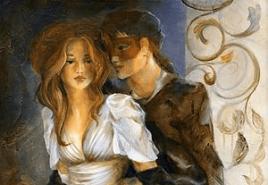Carl Maria von Weber Oberon. Carl Maria von Weber - composer, founder of German romantic opera: biography and creativity. Opera "The Magic Shooter"
The original name is Oberon.
An opera in three acts by Carl Maria von Weber with a libretto (in English) by James Robinson Planchet, based on the medieval French poem "Guon de Bordeaux".
Characters:
GUON DE BORDEAUX (tenor)
SHERAZMIN, his squire (baritone)
OBERON, King of the Fairies (tenor)
PUK, Titania's servant (contralto)
REZIA, daughter of Harun al-Rashid (soprano)
FATIMA, her servant (mezzo-soprano)
CHARLES THE GREAT, Emperor of the Franks (bass)
HARUN AL-RASHID, Caliph of Baghdad (bass)
BABEKHAN, Persian prince, groom of Rezia (baritone)
ALMANZOR, Emir of Tunisia (baritone)
conversational roles:
ROSHANA, wife of Almanzor
TITANIA, wife of Oberon
NAMUNA, Fatima's grandmother
Time of action: 9th century (if it ever happened).
Setting: fairyland, Baghdad, Tunisia, court of Charlemagne.
First performance: London, 12 April 1826.
James Robinson Planchet, who concocted this romantic semi-drama, reminiscent of a dream and which became the libretto of Oberon, was a fairly famous antiquarian in his time, a successful playwright and a recognized innovator of the English theater. He was the first in the history of English drama to dress the characters of historical plays in costumes that they could actually wear in their time, that is, he followed the path of historical accuracy. (The first such play was Shakespeare's King John, directed by Charles Kembel). He also cultivated a form of theatrical entertainment that combined music, dance, and acting. It was always something romantic, what we now call pantomime.
Oberon is indeed very much like a pantomime. What’s missing here: some characters sing, others have spoken parts; there is both ballet and magic here. And yet everything ends happily. However, the nature of this plot is not so different from “Free Shooter”, as it seemed to Weber at first when he received the book with the libretto. Kembel, who was then greatly impressed by Free Rifleman, made a special trip to Germany to persuade the composer to write an opera for Covent Garden, and the plot of Oberon was one of two that he persistently suggested that the composer take. Another subject was "Faust". Weber chose Oberon and Kembel chose Planchet to write the libretto.
Both the librettist and the composer were extremely conscientious people. Having written the libretto in English (Planchet was an Englishman, despite his French surname), he then translated it into French especially for Weber and sent this version to him. But Weber, meanwhile, took up the study of English himself and wrote the following to his co-author: thank you letter: “I thank you extremely for your kindness in translating the poems into French, but it was not necessary to do this, since I, although still weak, am still a diligent student studying English.”
It was this conscientiousness of Weber that turned out to be the reason for the sad end of our story. He was not yet forty years old, but he was already a very sick man when he accepted Kembel’s offer. Nevertheless, he wrote the music within six weeks, traveled to London himself to supervise all fifteen rehearsals, conducted about a dozen performances of the opera as well as several concerts, and then died quietly. He knew very well that he had little chance of recovery, but he did not spare his strength. The fee he earned for three months in London ($5,355) was truly God's mercy for his deprived wife and children.
The bright stage nature of the opera and the very high demands made by the score on the leading soprano and tenor stopped many talented directors who were planning to stage this opera; and many of the past productions, which were nevertheless carried out, to one degree or another distorted the author's intention. It can be stated that this opera, in its productions, knew both success and failure in equal measure. But in the mid-1950s, the Paris Grand Opera presented it as such a grand spectacle that the music seemed to be the smallest thing that drew crowds to see it. Perhaps there really is no other way to preserve the music of this opera for posterity than to perform the famous overture and the great soprano aria as concert numbers. In essence, that's all most of us have heard from this opera.
OVERTURE
Regular visitors to symphonic music concerts are so familiar with the overture from Oberon that they rarely realize that it is constructed from themes that play an important dramatic role in the opera itself. However, if you look at the overture in the context of the opera, you will find that each of its unusually familiar themes is associated with one or another dramatically significant role of this tale. Thus, the opening soft call of the horn is a melody that the hero himself plays on his magic horn; rapidly descending woodwind chords are used to paint a background or atmosphere of a fairytale kingdom; the excited, soaring violins that open the Allegro are used to accompany the lovers' flight to the ship; a wonderful, prayer-like melody, performed first by a solo clarinet and then by strings, truly turns into a hero’s prayer; while the triumphant theme, sung first calmly and then in joyful fortissimo, reappears as the climax of the grandiose soprano aria - “Ocean, you mighty monster.”
ACT I
Scene 1. Surrounded by fairies, their king Oberon sleeps; Meanwhile, the fairies, these fabulous creatures, sing for him. The servant of Titania, Oberon's wife, Puck tells us that Oberon and his queen Titania quarreled and the king swore that he would not make peace until he found a pair of mortal lovers who would be faithful to each other until the end of their days.
When Oberon awakens, regretting this turn of events, Puk tells him about a young legendary knight named Guyon de Bordeaux. This hero killed the son of Charlemagne in a fair fight, and this monarch pronounced a sentence: he must do the impossible. It consists of the following: Huon must go to Baghdad, kill there the one who sits on right hand caliph and win the love and hand of the daughter of the eastern ruler. Oberon sees in this an opportunity to fulfill his vow and, using supernatural powers, puts the knight Huon and his squire Sherazmin into a deep sleep. While they sleep, Oberon shows them a vision of the Caliph's daughter, Rezia, who cries out for help. When the vision disappears, Huon wakes up and Oberon tells him to save the girl. At the same time, Oberon gives him a magic horn, one has only to blow it, and help will not be slow to appear in a moment of danger. The scene ends with Huon, accompanied by a chorus, joyfully accepting the task. Oberon takes him to Baghdad.
Scene 2. In a purely dramatic episode, that is, one in which only conversations take place, not accompanied by music, Huon saves a dark-skinned stranger from a lion. When the danger is over, it turns out that the stranger is a Saracen prince named Babehan, who intends to marry Huon's beloved (the knight managed to fall in love with the vision) Rezia. Babekhan, this vile fellow, attacks Huon, calling upon his companions as his henchmen, but our valiant hero and his squire defeat the ungrateful villain.
Scene 3. Huon meets a very ancient old woman named Namuna, the grandmother of Rezia's charming maid, Fatima. Namuna knows all the palace gossip and tells him that Rezia is supposed to get married literally tomorrow. However, the bride apparently saw Huon in the vision that appeared to her and vowed to belong only to him and no one else. This scene, like the previous one, up to this point develops as a dramatic one (that is, in the form of spoken dialogues not accompanied by music), but when Huon is left alone, he sings a long and very difficult aria, in which he declares with even greater decisiveness in his quest to get a girl.
Scene 4. In her room in the palace of Harun al-Rashid, Rezia tells her servant Fatima that she will never marry anyone but Huon, and that if Babehan decides to marry her, she will commit suicide. Fatima tells her that help is at hand; two girls sing a duet; A march is heard behind the stage, and Rezia joyfully takes it up.
ACT II
Scene 1. In the throne room of the palace of Harun al-Rashid, the choir praises the legendary caliph. Babehan declares that he can no longer put off his marriage to Rezia, and now the fairy-tale bride appears before him, full of sorrow, accompanied by dancing girls. But the voices of liberators are heard outside. They fight their way into the Palace; Guon runs into the hall, sees Babekhan sitting to the right of the caliph, and kills him. He blows his magic horn, and everyone immediately freezes in the positions in which they were. Guon and Sherazmin escape, taking Rezia and Fatima with them.
Scene 2. In the garden of the caliph's palace, the guards are trying to detain four fugitives, but even here Huon's magic horn comes to their aid, although in the confusion he somehow manages to lose this important musical instrument. Fatima and Sherazmin suddenly discover that they are in love with each other, like their owners, and sing a love duet. He becomes a quartet of four lovers. Then they all board the ship.
Scene 3. To make sure that his chosen example of devoted love to the grave is indeed true, Oberon prepared another severe test for the lovers. Puk and his fabulous crew raise a terrible storm at sea, in which the ship with the lovers is wrecked. Huon, however, manages to drag the exhausted Resia to shore, where she comes to her senses after a touching prayer sung by her lover. He then goes in search of Sherazmin and Fatima, and Rezia is left alone to sing her most famous aria in this opera, “Ocean, you mighty monster” - a lengthy, highly dramatic and varied invocation of the ocean. At the end of her aria (which is similar to the end of an even more famous overture), she sees a ship approaching. Alas, this, as it turns out, is a pirate bot. The pirates land and tie up Rezia to kidnap her, but at the critical moment Guon comes running and attacks them. There are, however, a lot of pirates, and since the knight has lost his magic horn, he loses the battle and is left on the shore to die alone: the pirates go to their ship to set sail.
Nevertheless, the action ends on a calm note. Pook returns, leading the fairies with him. Oberon is with them. The two main characters sing a duet, and the fairies sing their own chorus; everyone on stage is satisfied with the progress of the intrigue. And the audience is delighted with the fabulous atmosphere that the music creates.
ACT III
The pirates sold Rezia into slavery in Tunisia; Fatima and Sherazmin found themselves in the same situation. The two young lovers, fortunately, serve a good-natured North African named Ibrahim (who never appears on stage), and from their duet it is clear that they are not so unhappy in their situation.
Puk, according to the plan, brings Huon to them. The knight learns that Rezia is rumored to be in the same city, and so they discuss how Huon can get into the service of Ibrahim so that he can look around. (The whole situation here, as well as what follows, is strikingly similar to the circumstances of Mozart’s “The Abduction from the Seraglio.”)
Scene 2. The Emir of Tunisia Almanzor himself turns out to be the new owner of Rezia. In his palace, Rezia, full of sorrow, grieves over her fate. At this moment, the emir himself appears to her to say that, although he likes her, he will not do anything against her will.
Scene 3. In a short scene that takes place again at Ibrahim's, Guon receives a message written in flowery oriental language. Fatima translates it. It is from Rezia, who calls him to come to her. In an ecstatic impulse, Huon rushes towards her.
Scene 4. But in the emir’s palace he is met not by Rezia, but by Roshana, the emir’s terribly jealous wife. Roshana offers him herself and her throne if he kills Almanzor. But neither Roshana’s intoxicating dance nor her feminine charms can make the faithful hero change his love. He tries to escape from her room, but just at that moment the emir enters with his guards, and Huon is grabbed. When Roshana raises her dagger to stab her husband, things take a dark turn. She is grabbed and taken away, and Huon is condemned to be burned alive. Rezia desperately stands up for him, but Almanzor, who has now become adamant, sentences her to the same terrible death.
But Sherazmin found - it is not known where or how - the good old horn, and it was safe and sound. He appears very opportunely - at the most critical moment, bringing Fatima with him. He blows the horn - and all the Africans, petrified, freeze, and the four lovers decide that the time has come to appeal to Oberon. (After all, he needs to be taught a lesson for all their misadventures.) Oberon gracefully appears, like a Deus ex machina at the end of a Greek tragedy, and immediately magically transports them to the court of Charlemagne. Huon reports to the emperor that his mission has been completed. Charlemagne forgives him. The opera's finale is a grandiose, jubilant chorus.
Postscriptum regarding the historical circumstances of this plot. The only reliable historical figures among the characters in the opera are Charlemagne, who ruled in the 9th century, and Harun al-Rashid, who ruled in the 8th century. Most of the main episodes of Oberon can be found in the legend of Huon de Bordeaux, dating back to XIII century, where our hero appears as an even more incredible figure than in the opera.
Henry W. Simon (translated by A. Maikapara)
Carl Maria von Weber was a famous German composer and musician of the 18th century, who was the cousin of Mozart's wife. He made a great contribution to the development of music and theater. One of the founders of romanticism in Germany. The composer's most famous works were his operas.
Carl Maria von Weber: biography. Childhood
Karl was born in the small German town of Eitin (Holstein). This event happened on December 18, 1786. His father was Franz Weber, who was distinguished by his great love of music. He served as an entrepreneur in a traveling dramatic troupe.
The future musician's childhood was spent among nomadic theater actors. This peculiar atmosphere greatly influenced the boy and determined his future. Thus, it was the theater troupe that instilled in him an interest in dramatic and musical genres, and also gave him knowledge about the laws of the stage and the musical specifics of dramatic art.
At a young age, Weber was also actively interested in painting. However, his father and older brother tried to introduce him more to music. Franz, despite constant travel, managed to give his son a good musical education.
First compositions
In 1796, Carl Maria von Weber studied piano in Hildburghausen, then in Salzburg he studied the basics of counterpoint in 1707, then in Munich from 1798 to 1800 he studied composition with the court organist Kalcher. During these same years, he took singing lessons.
Karl became seriously interested in music. And in 1798, under the direction of J.M. Haydn, he even created several fuguettes for the clavier. These were the composer's first works. Surprisingly, Carl Maria von Weber also began writing operas very early. Literally after the fugues, two of his major creations appeared, which we will discuss below, as well as a large mass, allemandes, ecosaises, and comic canons. But the most successful was the singspiel “Peter Schmoll and His Neighbors,” created in 1801. It was this work that won the approval of Johann Michael Haydn himself.
High post

In 1803, there was a significant development in the work of the future creator of German romantic opera. This year Weber arrives in Vienna, after a long journey throughout Germany. Here he meets the then very famous music teacher Abbot Vogler. This man quickly noted the gaps that existed in Karl’s musical theoretical knowledge and set about filling them. The composer worked hard and was highly awarded. In 1804, he, a seventeen-year-old young man, was accepted as a kopellmeister, that is, a leader, at the Breslau Opera House, thanks to the patronage of Vogler. This event marked a new period of Weber's work and life, which includes the following time frame - from 1804 to 1816.
The beginning of the most important period of creativity
The musical works of Carl Maria von Weber underwent a serious evolution at this time. In general, starting from 1804, the composer’s entire work changed. At this time, Weber's aesthetic views and worldview took shape, and his musical talent manifested itself most clearly.
In addition, Karl shows real talent as an organizer in the musical and theatrical field. And traveling with the troupe to Prague and Breslau revealed his abilities as a conductor. But it was not enough for Weber to master the classical tradition; he strives to transform and correct everything. Thus, he, as a conductor, changed the arrangement of musicians in the opera orchestra. Now they were grouped depending on the type of instrument. With this, the composer anticipated the principle of orchestral placement that would become popular in the 19th and 20th centuries.
Eighteen-year-old Weber defended his bold changes with all the fervor of his youth, despite the resistance of musicians and singers seeking to preserve the tradition historically established in German theaters.

Major works of this period
In 1807-1810, the musical, critical and literary activity of Carl Maria von Weber began. He begins to write reviews and articles about performances and musical works, begins a novel called “The Life of a Musician,” and writes annotations for his works.
The works written during the entire first period of the composer’s work make it possible to see how the features of the author’s future, more mature and serious style are gradually becoming more and more apparent. At that time highest value in artistic terms, musical and dramatic works of Weber acquire, among which:
- Singspiel "Abu Hasan".
- Opera "Silvana".
- Two symphonies and two untitled cantatas.
Also during this period, many overtures, songs, choir arias, etc. appeared.
Dresden period
At the very beginning of 1817, Carl Maria von Weber became conductor of the Dresden Deutsche Oper. In the same year, he married Caroline Brandt, an opera singer.

From this moment begins the most important and last period the composer's work, which ended in 1826 with his death. At this time, the conducting and organizational activities Weber. At the same time, he had to face many difficulties as a conductor and leader. The innovations of Karl Maria were actively opposed by the theatrical traditions that ruled for almost a century and a half, as well as by F. Morlacchi, the conductor of the Italian opera troupe in Dresden. Despite all this, Weber managed to assemble a new German opera company. Moreover, he managed to stage several excellent performances, despite the underprepared team.
However, one should not think that Weber the composer gave way to Weber the bandmaster. He managed to combine both of these roles and cope with them brilliantly. It was at this time that the master’s best creations were born, including his most famous opera.
"Free Shooter"
The story told in this opera originates from the folklore story of how a man sold his soul to the devil for magic dust that helped him win a shooting competition. And the reward was marriage to a beautiful lady with whom the hero was in love. For the first time, the opera embodied what was close and familiar to the German heart. Weber portrayed simple country life with sentimental naivety and crude humor. The forest, hiding otherworldly horror under a gentle smile, and the heroes, ranging from village girls and cheerful hunters to valiant and fair princes, were mesmerizing.
This whimsical plot merged with beautiful music, and the whole thing became a mirror reflecting every German. In this work, Weber not only freed German opera from Italian and French influence, but also managed to lay the foundations for the leading operatic form of the entire 19th century.
The premiere took place on June 18, 1821 and was a dizzying success with the audience, and Weber became a real national hero.
The opera was later recognized as the greatest creation of the German national romantic theater. The composer, taking the singspiel genre as a basis, used broad musical forms that made it possible to saturate the work with drama and psychologism. A large place in the opera is occupied by detailed musical portraits of the characters and everyday scenes associated with German folk song. Musical landscapes and fantastic episodes were very clearly expressed thanks to the richness of the orchestra created by Weber.

The structure of the opera and its musical features
“Free Shooter” begins with an overture, dominated by smooth melodies from the horns. A mysterious romantic picture of the forest is drawn before the viewer, and the poetry of ancient hunting legends is heard. The main part of the overture describes the struggle of opposites. The introduction ends with a solemn and majestic coda.
The action of the first act unfolds against the background of mass cheerful scenes. We see pictures of peasant holidays, beautifully recreated thanks to choral introductions and folk musical motifs. The melody sounds as if it was actually played by village musicians, and the village simple waltz is simple and naive.
The aria of the huntsman Max, which is full of anxiety and confusion, contrasts sharply with the holiday. And in the drinking song of the second huntsman Kaspar, a sharp rhythm is clearly heard, encouraging rapid action.
The second act is divided into two scenes that contrast with each other. In the first part, we first hear the carefree Arietta Angel, who serves to highlight the spiritual purity and depth of feelings of her friend Agatha. The picture is filled with alternating song melodies and expressive recitatives, which help to better understand the girl’s experiences. The final part is filled with joy, light and sparkle.
However, already in the second picture the dramatic tension begins to increase. And the main role here is given to the orchestra. The chords sound unusual, dull and gloomy, terrifying, and the part of the choir hidden from the audience enhances the mystery. Weber managed to achieve a stunningly believable musical depiction of the rampant evil spirits and demonic forces.
The third act is also divided into two scenes. The first immerses the viewer in a calm, idyllic atmosphere. Agatha’s part is permeated with poetic, bright melancholy, and the chorus of girlfriends is painted in soft tones, in which national motifs are felt.
The second part opens with a chorus of hunters, accompanied by the sound of hunting horns. In this choir you can hear German folk tunes, which later gained worldwide popularity.
The opera ends with an extended ensemble scene with a choir, accompanied by a joyful melody, the leitmotif running through the entire work.
The creation of Oberon and the last days of his life
The fairy-tale opera Oberon was written in 1926; it completed a wonderful series of operatic works by the composer. Weber wrote it in order to provide for his family. The composer knew that he would soon die, and there would be no one else to take care of his loved ones.

"Oberon" in its form was completely different from Weber's usual style. For the composer, who always advocated the merging of opera with theatrical art, the structure of the work was ponderous. However, it was for this opera that Weber managed to create the most exquisite music. By the time he finished writing Oberon, the composer’s health had deteriorated greatly, and he could barely walk, nevertheless, Karl Maria did not miss the premiere. The opera received recognition, and once again critics and audiences praised Weber's talent.
Unfortunately, the composer did not have long to live. A few days after the premiere, he was found dead. It happened on June 5, 1826 in London. It was on this day that Weber was going to return to his homeland in Germany.
In 1861, a monument to Weber was erected.
First youth opera
“The Dumb Forest Girl,” the composer’s first major work, deserves special mention. The opera premiered in 1800 in Freiburg. Despite the youth and inexperience of the author, it was a success and gained recognition. It can be said that this production of this work marked the beginning of Weber's composing career.
As for the opera, it was not forgotten and for a long time continued to appear in theater programs in Prague, Vienna, St. Petersburg and other cities of the world.
Other works
Weber left behind a rich creative heritage, which can be listed in in full almost impossible. But let's highlight his most significant works:
- 9 operas, including “Three Pintos”, “Rubezal”, “Silvana”, “Euryanthe”.
- Musical accompaniment for seven dramatic plays.
- Solo and choral vocal works include 5 masses, more than 90 songs, more than 30 ensembles, 9 cantatas, and about 10 arrangements of folk songs.
- Piano works: 4 sonatas, 5 pieces, 40 duets and dances, 8 variation cycles.
- About 16 concertos for piano, clarinet, horn and bassoon.
- 10 works for orchestra and 12 for chamber ensemble.

The composer Weber was a very extraordinary person with his own characteristics, advantages and disadvantages.
For example, he hated other people's fame. He was especially intolerant of Rossini. Weber constantly told friends and acquaintances that Rossini's music was mediocre, that it was just a fashion that would be forgotten in a few years.
A tragic accident led to Weber losing his beautiful voice. Once in Breslavl, the composer was waiting for a friend for dinner, and in order not to waste time, he sat down to work. Weber quickly froze and decided to warm up with a sip of wine. But due to the evening twilight, he confused the flask with the drink with the one in which his father kept sulfuric acid. The composer took a sip and fell lifeless. When his friend arrived, no one answered his knock, but there was light in the windows. He called for help, the door was opened, and Weber was quickly taken to the hospital. Doctors saved the composer's life, but oral cavity, his throat and vocal cords were so burned that he was forced to speak only in a whisper for the rest of his days.
Weber loved animals very much. In his house lived a dog, a cat, many different birds and even a capuchin monkey. Most of all, the composer loved the Indian crow, who could say: “Good evening.”
Weber was egocentric. He loved himself so much that he even wrote laudatory articles about himself under a pseudonym, which were published from time to time in newspapers. But the matter did not stop there. The composer loved himself so much that he named three of his four children by their own names: Maria Carolina, Karl Maria, Carolina Maria.
Without a doubt, Weber was a very talented musician and composer who made an invaluable contribution to the development of German art. Yes, this man was not without flaws and was distinguished by vanity, but every genius has his own quirks.
Opera "Oberon, or the Oath of the Elf King"
(from English “Oberon, or The Elf King's Oath”) - a magical romantic opera in three acts. Composer - Carl Maria von Weber. The author of the English libretto is playwright and theater critic James Robinson Planchet.
The premiere took place in London on April 12, 1826.
The plot is based on the fairy tale epic " Oberon, king of wizards" by the German poet Christoph Martin Wieland.
One day, the king and queen of the elves (Titania and Oberon) quarreled. They decided to get together only if there was at least one pair of lovers faithful to each other in the human world. Soon one of the king's servants tells Oberon about the knight Gion - one faithful lover. Gion killed the prince at a knightly tournament, and to atone for his guilt he must go to distant Baghdad, take the life of the one sitting to the left of the caliph and kiss the ruler’s daughter Rezia. Rezia and Gion saw each other in a dream and were already dreaming about the upcoming meeting. Very soon they finally saw each other. But the girl already had a groom - Prince Babekan, the same man who sits on left hand caliph. And he asks the ruler not to delay the wedding. The guards bring Rezia, accompanied by the servant Fatima. Soon Gion appears along with the squire Sherazmin, kisses his beloved, kills Babekan and, with the help of Oberon's horn, plunges the audience into stupor and meanwhile leaves the palace with the princess.

Sherazmin declares his love to Fatima. Suddenly the guards appear again, but Oberon's horn again rescues all the lovers from trouble and they go to their ship. But due to an elven spell, the ship sinks, and the boat on which Gion and Rezia were fleeing is washed ashore. The knight leaves to look for shelter, and meanwhile Rezia is kidnapped by pirates. In the battle with them, Gion loses consciousness. Oberon appears and orders the elves to keep Gion's sleep for seven days, and then transfer the knight to the garden. There Gion meets a squire and a servant. They report that Emir Almanzor bought Rezia under the guise of a slave. Now everyone is rushing together to rescue her. Meanwhile, Rezia rejects Almanzor, and his wife (Roxana) vows revenge on him for leaving her. Roxana asks Gion to kill the emir, but he catches their conversation and orders Gion to be executed. Even Rezia, who has already declared herself the wife of the emir, fails to beg for mercy for her lover. She is preparing to die with him. Sherazmin blows the horn and Oberon appears. He announces that the test is over and Titania is satisfied. The last action takes place in the throne room of Charlemagne. The king forgives Gion for the death of the prince, a jubilant audience praises the loyalty of the lovers.
History of creation
.
The opera “Oberon, or the Oath of the Elf King” was written specifically for the royal opera house “Covent Garden” by order of the director of the theater. At the end of the summer of 1824, Weber was asked to write a fantasy opera based on one of two plots - “Faust” or “Oberon”. Despite serious health problems, the composer began working hard on the opera. The titanic work paid off - the opera was an incredible success.
"Oberon, or the Oath of the Elven King"
occupies a special place in the composer's repertoire. The music harmoniously combines lyrics and humor, irony and dreams. Traditionally for his works, Weber manages to weave an elegant love thread into the canvas of everyday scenes.
Fun facts:
- the author of the play himself conducted at the premiere of the opera.
- opera "Oberon, or the Oath of the Elf King"- the last completed composition by Carl Maria von Weber.
- Weber was already seriously ill with tuberculosis when he agreed to write the opera. The contract with the Royal Opera promised a hefty fee of £1,097 6s, and Weber's family was desperately in need of funds at that time.
- The premiere was a resounding success. The full hall enthusiastically greeted the composer. Moreover, some performances were even interrupted by applause. At the end of the play Carl Maria von Weber was called to the stage with a thunderous ovation. Such an honor has never been given to any composer in London.







